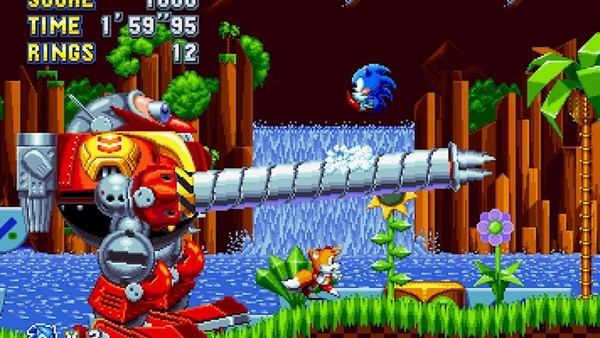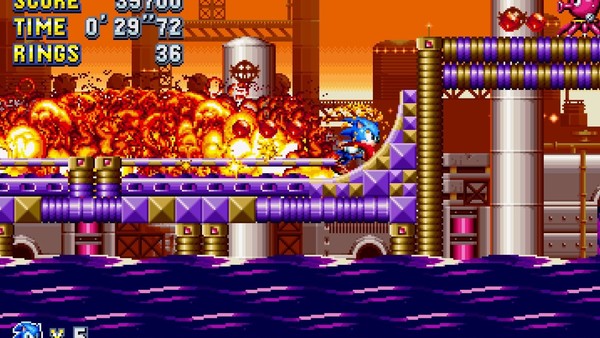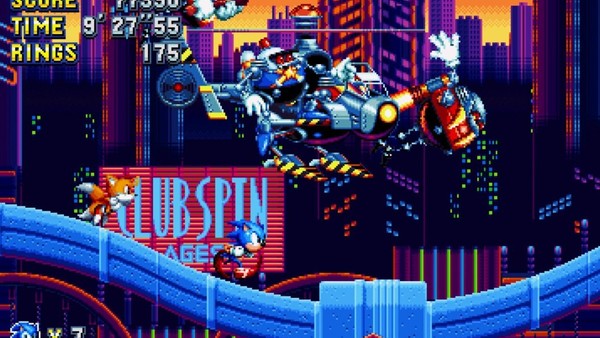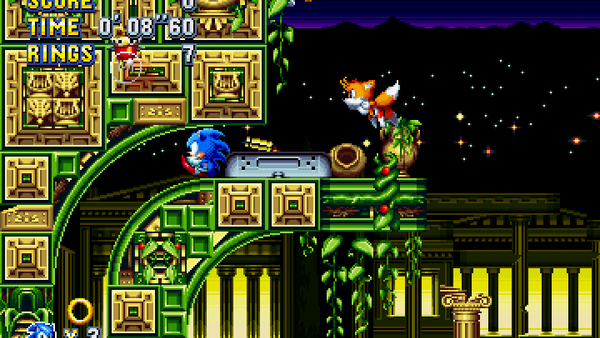Sonic Mania Review: A Garden Of Green Hill Delights
King of the Rings

Since finally getting my hands on Sonic's long-awaited return to his roots, I've been plodding around the house rubbing every lamp trying to find in which one the genie resides. By my estimation, I'm owed another two wishes - but I'm more than content if this is the only one that comes true.
Put simply, Sonic Mania is the six winning spiny blue balls on every Sonic fan's lottery ticket, an unestimable jackpot that has you waiting for the inevitable wake-up call. But it never happens; this, despite every reasonable doubt telling us otherwise, is for real. If the majority of Sonic games over the past two decades were the literal wet dreams of series followers - embarrassing, uncomfortable, and unwelcome - Sonic Mania is the ultimate metaphorical equivalent.
From the moment the word "SEGA!" blares from the fondly-familiar opening splash screen, Sonic Mania has the heart of every Sonic fan in its hands. The eponymous hero emerges through a giant ring, superimposed against the backdrop of a wildly rotating tropical island, just as he once did before he found a new attitude, new shoes, and a devastating new dimension. The hedgehog homage never lets up from this point. From the faithful, brightly coloured Mega Drive era pixel-art to the FM synth of Tee Lopes' wonderful soundtrack, Christian Whitehead and his team of die-hard franchise devotees have produced a game that Yuji Naka himself would struggle to make more 'Sonic'.
The story is satisfyingly simple. Immediately following the events of Sonic & Knuckles, Sonic and co. don't even get the chance to put their feet up and enjoy a corn dog, as the extremely hard-working Dr. Robotnik has already assembled a team of Egg-robots - the Hard-Boiled Heavies - intent on spoiling their well-deserved day off. Coming into contact with a mysterious emerald, the enterprising Eggman sends our protagonists back in time, making off with ill-intent, emerald in hand. It's possibly even a little too complicated compared to the traditional 'man who looks like an egg puts animals in robot' narrative, but there are no theme parks or interstellar princesses muckying Mobius here. That's a godsend.

As much as the plot revolves around the past - and trades chiefly on nostalgia - it is an incredible evolution of the formula rather than a tired retread. Thrust back to the well-trodden surroundings of Green Hill Zone, the opening 20 seconds of Sonic Mania are identical to 1991's opening level. Then, the first lightning shield appears, the level expands outwards and upwards, and the concept grows before your eyes. It's a beautiful contrast which perfectly establishes Mania's philosophy; celebrate the past, but don't get stuck in it. It's the same story for all of Sonic Mania's reused levels, where the best bits are retained but the rest is entirely original. In the spirit of Sonic 3, changing acts sees the stage re-dressed with new scenery and original action. In most cases, the first half offers an 'ultimate' version of a classic zone, with the post sign-post part giving full license to creativity.
The game is a treat for all the immediate senses. The visuals don't limit themselves by working within the restrictions of legacy hardware in the way of, for example, MegaMan 9, but instead offer natural progression. It's as if a fifth Sonic the Hedgehog game had been released on the Mega Drive, full of refinements and upgrades, but still clearly part of the same canon. In motion, Mania is an utter joy to behold, featuring some of the finest animation this side of SNK. The soundtrack isn't quite right in this regard - it far eclipses the capabilities of the Mega Drive's audio hardware - but stylistically it's totally true to the 'Blue Blur's quintessential quartet, and even more so the fabled Japanese version of Sonic CD's soundtrack.
Crucially, the game feels right. Sonic Mania may seem like an obvious game to make, and it is: we've been here before with Sonic 4. Yet Dimps' 2010 attempt to continue the series from the star post before the abyss, for all its good intentions, made a bigger hash of it than a Dutch dope dealer. Aside from being just the sort of tired repeat Sonic Mania isn't, the titular hero controlled more like an actual hedgehog than the smooth cerulean speedster we know and love. The literal missteps were unforgivable, and thankfully Whitehead and crew have avoided the same spike pits. Sonic moves with the same momentum as on the Mega Drive, never coming unstuck by a slope or bouncing with the unnatural weight of an Olympic hammer. It's such a simple, fundamental thing to get right, and it's almost farcical that it should be a point of praise, but burnt fingers demand oven mitts. No plates dropped this time, however.

Nostalgia obviously reigns supreme throughout Sonic Mania, and many of the references, both outright and hidden, will have Sonic fans welling-up. Most zones incorporate elements from others in the series, intelligently masking them in fresh guises whilst pushing their use to their natural conclusion. Two of the game's most inventive boss fights even call back two of Sonic's more popular spin-offs, one of them so ridiculously ingenious yet so appropriate it's almost worth the price of admission alone.
That's not to say Mania is reliant on old ideas to make up for a lack of its own. The throwbacks exist to tickle the nostalgia nerve, but the game's unique concepts are just as thrilling. The four brand-new zones aren't overshadowed by the legacy of those they sit beside, and arguably stand out the most. In fashion typical of the series, they depend on classic themes - forest, desert, city - subtly subverted to make them oh-so Sonic. A romp through a TV studio is a particular highlight, a natural successor to the bright lights of Casino and Carnival Nights, one which isn't shy about stretching its concept to the very limit.
Likewise, the game's boss battles don't just push the envelope, but send it first-class to the moon. Appearing at the end of every act à la Sonic 3, the regular face-offs with Robotnik and his cronies are perhaps Sonic Mania's most enjoyable moments. Whether it's a giant toy capsule dispenser doling a series of painful playthings or an exhilarating race against a dastardly doppelganger, each fight is as entertaining as it is challenging, and it's clear the bottle labelled 'imagination' was left totally uncorked.

It's extremely difficult to find faults with the game, and with the bias of a hardcore hedgehog fan, it's heartbreaking to do so. However, it does have a handful of spiky moments. Sudden and unavoidable instant deaths - long a bugbear of Sonic naysayers - exist in all their inglorious nature here, but frankly Mania would have been incomplete without them. At times, the level design leans a little too hard on the Sonic CD template of less-defined paths, which can be a touch overwhelming - but anything which encourages repeated playthroughs can only be a good thing.
Sonic slept through the Saturn, and it took a Dreamcast to awaken him - along with a shunt into the third dimension. 3D promised lots for the industry, but the transition would ultimately leave SEGA's once super-slick mascot in the dust. Moving with the times, the franchise rapidly began to go downhill faster than a skateboard in City Escape, and with so many high-profile failures and aborted attempts to revive the glory days, it seemed like Sonic was just begging to be put into hibernation.
It's taken a huge slice of humility, but by handing the franchise over to the fans, Sonic has finally been able to redeem his tattered reputation. With Sonic Mania, Christian Whitehead and his passionate team of erinaceinae enthusiasts haven't just created a game which pays tribute to the golden years of the series, but a Garden of Green Hill delights which eclipses it to stand as the best Sonic the Hedgehog game of all time.